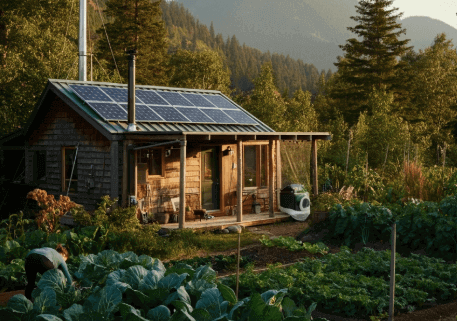Are you dreaming of a self-sufficient lifestyle away from the hustle and bustle of city life? With its diverse landscapes and mild climate, Florida offers numerous opportunities for off-grid living. This guide explores the best places and strategies on where to find off-grid land in Florida. From secluded forests to serene coastal areas, we’ll help you discover the perfect spot to build your off-grid oasis. Whether you’re a seasoned homesteader or just starting your journey toward sustainable living, our comprehensive overview will provide invaluable insights on where to find off-grid land in Florida.
Steve Daria and Joleigh, seasoned real estate investors with extensive experience in Florida’s unique property market, are crucial in guiding prospective off-grid enthusiasts. Their expert land acquisition and development insights have helped numerous individuals transition to a self-sufficient lifestyle. Finding the perfect off-grid land in Florida becomes a seamless and informed process with their assistance.
What Does Off-Grid Living Mean?
Off-grid living implies being independent of public utilities and infrastructure.
This means generating your own electricity, managing your water supply, and possibly even growing your own food.
It’s about creating a self-reliant lifestyle, often with an emphasis on sustainability and less environmental impact.
For those looking where to find off-grid land in Florida, understanding these basics is crucial.

Benefits of Off-Grid Living
Living off-grid offers numerous benefits, such as:
- Reduced utility bills
- Increased self-sufficiency
- Lower environmental footprint
- Enhanced connection to nature
Challenges of Off-Grid Living
While appealing, off-grid living isn’t without its challenges. These might include:
- Initial setup costs
- Learning new skills
- Maintenance of systems (e.g., solar panels, water filters)
- Limited access to emergency services
Get Started: Get Your Cash Offer Below…
We are direct land buyers. There are no commissions or fees and no obligation whatsoever. Start below by sharing where your property is and where we can send your offer…
Why Choose Florida for Off-Grid Living?
Choosing Florida for off-grid living has advantages. This includes:
Year-Round Sunshine
Florida’s year-round sunshine offers a significant advantage for those interested in living off the grid, particularly in terms of harnessing solar energy.
The state’s abundant sunshine allows for consistent and reliable solar power generation throughout the year, reducing dependence on traditional utility grids.
This makes Florida an ideal location for installing solar energy systems that can power homes and properties sustainably, contributing to energy independence and environmental sustainability efforts.
Diverse Ecosystems
Florida’s diverse ecosystems encompass a wide range of landscapes, from its renowned coastal regions along the Atlantic and Gulf coasts to its expansive forests and wetlands.
This diversity provides prospective off-grid land seekers with ample choices to align their preferences with their desired environment.
Whether one seeks the tranquility of a secluded forest retreat or the serenity of a beachside haven, Florida’s varied ecosystems offer opportunities to find off-grid land that caters to individual lifestyles and aspirations.
Legal Considerations
In Florida, off-grid living is generally welcomed, benefiting from a regulatory environment that is more accommodating compared to many other states.
However, prospective buyers should conduct thorough research into local zoning rules and building codes before purchasing land.
This ensures compliance with specific regulations that may dictate permissible land uses, construction methods, and utility provisions, thereby avoiding potential legal issues or setbacks in establishing an off-grid lifestyle in the state.
Where to Find Off-Grid Land in Florida
Explore these essential steps on where to find off-grid land in Florida:
Research Potential Areas
Start by researching various regions in Florida.
Look for areas with favorable climates, good water sources, and access to natural resources.
Some popular regions for off-grid living include:
- North Florida’s rural areas
- Central Florida’s forests
- South Florida’s swamps and wetlands
Evaluate Accessibility
When considering off-grid land in Florida, accessibility is a crucial factor to balance alongside the desire for solitude.
Remote locations may offer unparalleled privacy and immersion in natural surroundings, but they can also pose logistical challenges in terms of accessibility.
Before purchasing off-grid land, it’s essential to assess the accessibility of the property, considering factors such as road conditions, proximity to major highways or towns, and ease of travel during different seasons.
While remote locations may require longer travel times or rugged terrain navigation, they often reward residents with breathtaking landscapes and undisturbed environments.
Check Water Sources
Water is a critical resource for off-grid living.
Investigate available water sources on the property, such as rivers, lakes, or underground wells.
Reliable water access is essential for drinking, gardening, and other daily needs.
Understanding Zoning and Regulations
Understanding zoning and regulations for your off-grid living is crucial.
Local Zoning Laws
Different areas have different zoning regulations.
Before purchasing land, verify that the property is zoned for residential or agricultural use.
This will ensure you can legally live on and develop the land.
Building Codes and Permits
Check local building codes to understand what is permissible.
Some areas might require permits for constructing homes, installing septic systems, or setting up solar panels.
Compliance with these laws is important to prevent legal issues.
Environmental Regulations
Florida has various environmental regulations aimed at protecting its natural beauty.
Ensure your plans align with these regulations, especially if the land is near protected areas or bodies of water.
Financial Considerations
Here are the financial considerations when planning to purchase off-grid land.
Cost of Land
Land prices vary based on location, size, and proximity to amenities.
Rural areas tend to be more affordable but may lack certain conveniences.
Compare prices across different regions to find a balance that suits your budget.
Financing Options
If you need financial assistance, explore various financing options, such as:
- Traditional mortgages
- Land loans
- Owner financing

Long-Term Investment
Consider the long-term value of your investment.
Off-grid properties can appreciate over time, especially as interest in sustainable living grows.
Building Your Off-Grid Home
Explore these tips for building your off-grid home.
- Design and Layout: Design your home to maximize efficiency and comfort. Consider factors like sunlight exposure, natural ventilation, and the placement of solar panels.
- Sustainable Building Materials: Opt for sustainable building materials to minimize environmental impact. Examples include reclaimed wood, bamboo, and recycled metals.
- Off-Grid Systems: Invest in reliable off-grid systems, such as solar power systems, rainwater harvesting systems, and composting toilets.
Tips for Successful Off-Grid Living
Discover these essential tips to successfully navigate your off-grid living.
- Start Small: If you’re new to off-grid living, start small. Gradually transition to a fully off-grid lifestyle to avoid becoming overwhelmed.
- Learn New Skills: Off-grid living requires various skills, from gardening to basic carpentry. Invest time in learning these skills to become more self-sufficient.
- Community Engagement: Engage with local communities and online forums. Fellow off-grid enthusiasts can offer valuable advice, support, and friendship.
Conclusion
Knowing where to find off-grid land in Florida can be a fulfilling pursuit, offering a chance to create a sustainable, self-sufficient lifestyle. By understanding the basics of off-grid living, researching potential areas, and considering all financial and regulatory aspects, you can find the perfect slice of serenity. For more personalized guidance and to explore available properties, consider consulting with a local real estate agent specializing in off-grid land.
**NOTICE: Please note that the content presented in this post is intended solely for informational and educational purposes. It should not be construed as legal or financial advice or relied upon as a replacement for consultation with a qualified attorney or CPA. For specific guidance on legal or financial matters, readers are encouraged to seek professional assistance from an attorney, CPA, or other appropriate professional regarding the subject matter.
